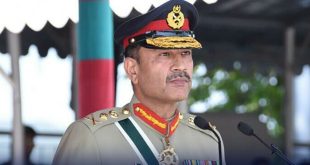Pakistan establishment is hegemony of military over civilian sections of establishment
By Zulfiqar Shah-If briefed, Pakistan establishment has many layers of political and strategic decision making, governing and coordinating within and between Centre and the Provinces. For example President, Prime Minister, Chairman Joint Chiefs of Staff Committee, Chiefs of Army, Navy and Air Force, Director General of ISI, and National Security Advisor (NSA) are the core of height of establishment, constitutionally led by Prime Minister in terms of governance and by President in terms of state which also includes the decision of war making as well as use of nukes. There are two issues. One, numbers, and constitutional as well practical powers of elected civilian representation are fewer and limited respectively in the premier layer of establishment. In this layer, three are civilians, if NSA is also civilian. This also includes a Prime Minister. Remaining five are from armed forces and a services. Hence, permanent inclusion of Foreign Minister, Chief Justice of Pakistan and occasional participation of four Chief Ministers according the nature of certain decision making, including the decision for the nuclear use would give a real sense of democracy. Besides, Director General ISI as well as Head of Intelligence Bureau should be made issue based participants of this layer of the establishment. DG ISI opinion is usually shared with President of Pakistan and Chairman Joint Chiefs of Staff Committee, as well as Chief of Army Staff of Pakistan, especially after the procedural and practical changes that have taken place due to addition of a four-star General / Martial for the designation of Chairman Joint Chiefs of Staff Committee. Besides, the seat of Chairman Joint Chiefs of Staff Committee should also have an Air and Naval head on the seniority as well as other consideration bases.
The second tier of Pakistan Establishment, these days, is having Chief Justice of Pakistan, Chief Secretary of Pakistan, Foreign Minister, Foreign Secretary, Chairman Senate of Pakistan, Interior Minister, Director General Military Intelligence; head of Intelligence Bureau, and occasionally is participated by the Speaker National Assembly (Lower House), Chairmen Senate Standing Committees, heads of National Assembly Committees, parliamentarians with special tasks, if any. Foreign Minister should be made part of premier layer of establishment, and Foreign Secretary along with his / her team are key advisors to him; and Chief Ministers should be made periodic part of this layer of establishment for the efficacy and appropriate participation in terms of governance and internal security.
The third tier of the Establishment consists, federal and state Ministers, federal secretaries of various ministries / departments, and a similar participation from some other sections of the governance are party of this.
Sindh, Balochistan, and other provincial establishments are a proto-type of the centre; however the role of Governors and Corpse Commanders of Pakistan Army is key in the most of important matters, however Chief Ministers and Home Ministers, are part of the first layers of provincial establishment with issue based participation of Director General Pakistan Rangers – Sindh; provincial heads of intelligence services, and Inspector General of Sindh Police. Chief Justice is not a permanent part of provincial establishment anywhere in the provinces. The second layer of provincial establishment is periodic, with participation of provincial ministers, provincial secretaries, relatively frequent participation by the heads / representation of intelligence services and similar others. Practical arrangements are different in Punjab, and to certain extent in Khyber Pakhtunkhuwa due to military operation in Federally Administered Tribal Areas (FATA) and other parts of Khyber Pakhtunkhuwa. In Punjab, practical role of Chief Minister is of head not only of governance but also of the province. Besides, Punjab Chief Ministers much before eighteenth constitutional amendments held agreements with the representations of other countries directly. Punjab Chief Minister has more influence in central affairs, including foreign policy and security, whilst rests have almost non-existent. This is because; ethnic establishment of Pakistan is predominantly Punjabi in almost all of its structures.
Meanwhile, Hindu, Christians, Shia and other minorities should also be given proportionate / appropriate share in the security and governance establishment, which today is almost non-existent. Besides, Sindh, Balochistan and other provinces Chief Justices should also be practically made part of provincial establishments.
Since Sindh, like Balochistan, have never been consulted on the foreign affairs and policies of Pakistan since 1947, and Sindhi and Baloch, like Siraiki and Khyber Pakhtunkhuwa people, do not have their due share in the Ministry of Foreign Affairs, therefore foreign policy of Pakistan should be considered the policy of Punjab. Therefore, all foreign policy related affairs; exclusively those to which Sindh, Balochistan and others are direct parties should be undertaken with Provincial consent. This includes, the Indus Water Treaty inclusive of Kabul River matters, Seer Creek, the regional and international climate change initiatives, borders affairs — both provincial and international, existence of foreign forces on the land(s), water and air of Sindh and Balochistan, and others should be decided with consent by the concerned provincial governments. Sindh and Balochistan believe in the doctrine of national security and sovereignty inclusive of people along with the territory. Sindh and Balochistan promote this for the better tomorrow.
- M. Syed said, “Sindh is a historical country; nation; and the freedom of Sindh is possible”, and can be claimed unavoidable. Sindh is also a Sovereign state. Sindh state has evolved through thousands years of Kingdoms / Emirate and finally modernized under colonial Britain, after having more than a dozen treaties and instruments signed between Sovereign Kingdom of Britain and Emirate of Sindh. Simultaneously, the Khanate of Balochistan had at least one Sovereign Treaty with the Kingdom of Britain. The self rule to Sindh and Balochistan, as well as others, if not liberation, will not only serve the interests of 200 million citizens across the Indus lands in Pakistan, it will also ensure the peace and security in South Asia, and will ensure global security and legitimate international stakes and interests.
Shah is a Sindhi refugee journalist, activist and analyst currently staying in New Delhi, India [email protected]
 Afghanistan Times
Afghanistan Times




